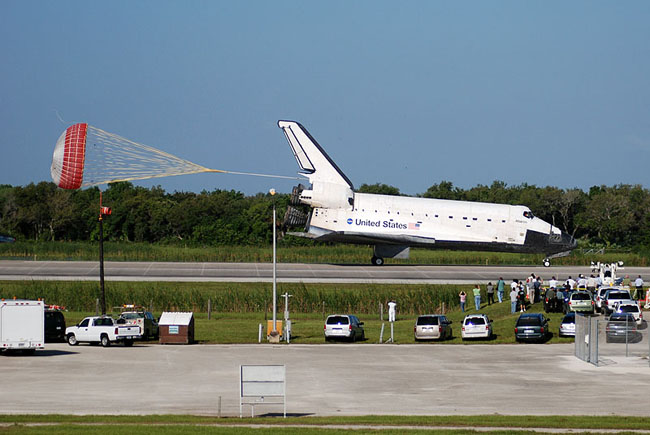NASA: Final Space Shuttle Launch May Move to 2011

CAPE CANAVERAL ? The last scheduled space shuttle flight islikely to slip into early next year, Kennedy Space Center (KSC) Director BobCabana said Tuesday.
After that and possibly onemore mission next summer, if funding is approved, Cabana hopes to see KSCtransition to a future less reliant on a single NASA program like Apollo, theshuttle or even Constellation.
"What we don't want to be in the future is tied to anyone large program," he told about 300 attendees at the National Space ClubFlorida Committee's monthly lunch meeting, held at the Radisson Resort at thePort.
"We want to spread the wealth a little bit, so thatwhen these programs come and go, it doesn't impact us in the community or atthe space center so much," he said.
Cabana outlined a future based on President Barack Obama'sproposed 2011budget, which would cancel the major human spaceflight program that hadbeen expected to replace the shuttle, called Constellation.
Instead, Cabana said KSC would serve as a state-of-the-artlaunching point for both government and commercial missions, manned orunmanned, with the help of nearly $2 billion over five years to upgradefacilities.
A former shuttle launch pad -- likely 39B, which isscheduled to be demolished starting this summer -- would be reconfigured toserve a variety of commercial vehicles.
Get the Space.com Newsletter
Breaking space news, the latest updates on rocket launches, skywatching events and more!
Technology research now restricted to a few areas would bebroadened to become a focus for the center, related to the development andtesting of heavy-lift rocket propulsion systems and "flagship"technologies needed for deep space missions.
The center would help launch NASA science missions androbotic precursors to human exploration missions, prepare payloads for theInternational Space Station and oversee flights by astronauts on commercialrockets and spacecraft.
"If we do it right and the money's there, we canactually end up with more work further down the road," Cabana said."We'll have something that's sustainable, and we'll be better off in theend."
He acknowledged difficult days ahead after the shuttle'sretirement, when up to 8,000 KSC contractors will face layoffs, accordingto local estimates.
But he said thousands of job losses were expected even ifConstellation proceeded.
"We just have a little bigger problem to dealwith," he said. "And we've been working on it."
In the near term, Cabana said the dates of two remainingshuttle missions are likely to slip, as many expected.
The final scheduled flight of Discovery, targeted for Sept.16, could end up in October.
An Endeavour flight targeted for late November is likely tomove to February because the payload, the $1.5 billion Alpha MagneticSpectrometer, won't be delivered to KSC in time to support the earlier date.
It's not yet clear how NASA would pay for flights next year.The shuttle program has funding to fly through the end of 2010, and managershave said savings set aside along the way could support operations for anothermonth or two.
The White House and Congress are considering adding a thirdand finalshuttle mission that could be flown next June. Each additional month ofshuttle operations would cost $100 million to $200 million.
"For sure, we've got two more," Cabana said.
- Gallery - Photos From the Last Launch of Atlantis
- Space Shuttle Atlantis By the Numbers: A 25-Year Legacy
- What Will NASA Do With the Retired Space Shuttles
Published under license from FLORIDA TODAY. Copyright ?2010 FLORIDA TODAY. No portion of this material may be reproduced in any waywithout the written consent of FLORIDATODAY.
Join our Space Forums to keep talking space on the latest missions, night sky and more! And if you have a news tip, correction or comment, let us know at: community@space.com.
James Dean is a former space reporter at Florida Today, covering Florida's Space Coast through 2019. His writing for Space.com, from 2008 to 2011, mainly concerned NASA shuttle launches, but more recently at Florida Today he has covered SpaceX, NASA's Delta IV rocket, and the Israeli moon lander Beresheet.









